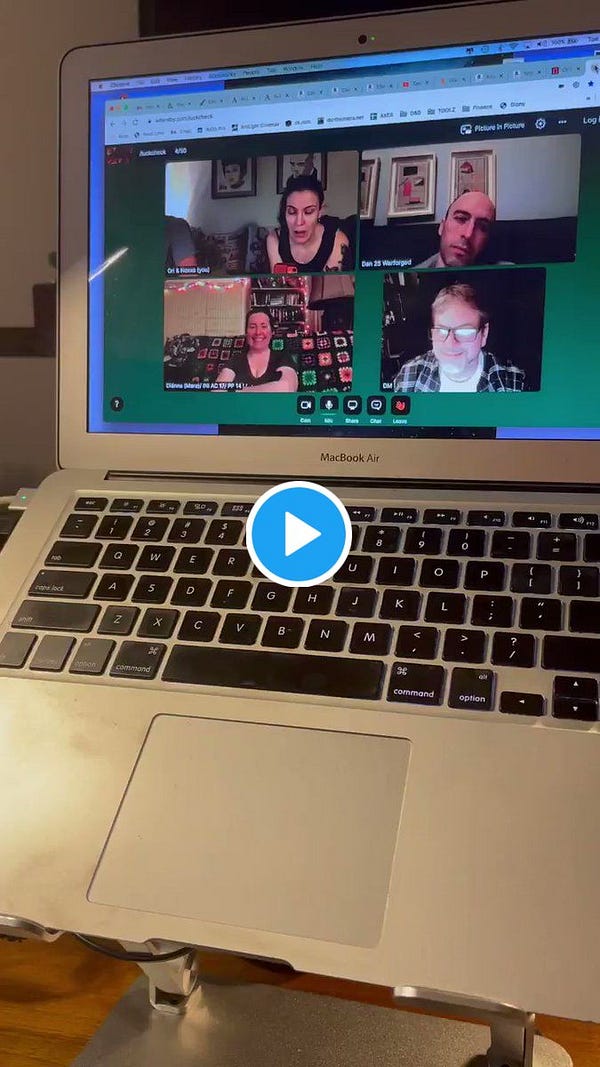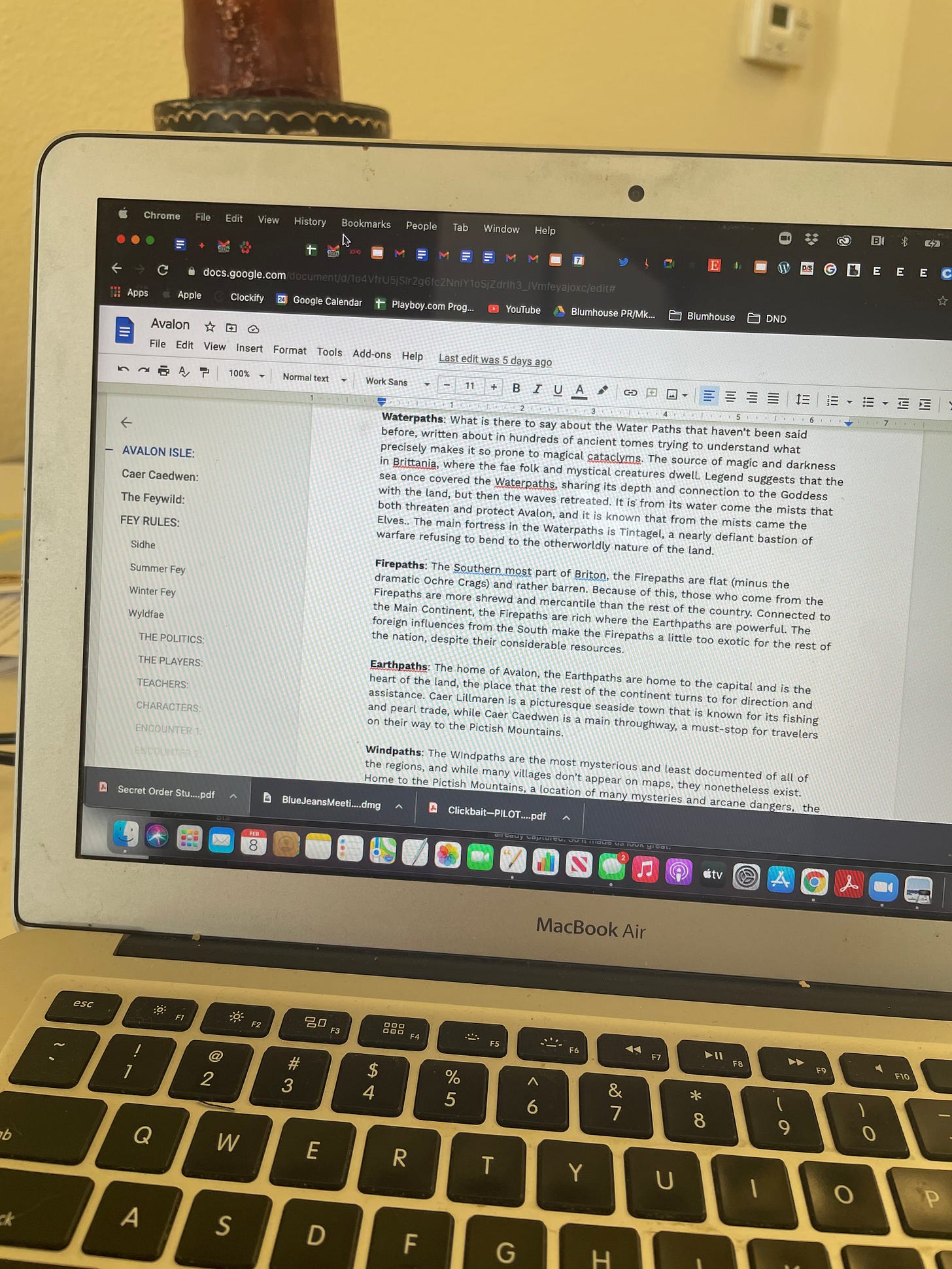I was reading the almost-always accurate Faculty of Change’s predictions for consumer habits in 2021 and I was struck by the oddly sanitized concept of friendships as “considered constructs”— or organizing your social circle deliberately, with planned times and shared Google calendars. For introverts and luddites, this sounds terrifying: it’s hard enough to psych yourself to go out to a restaurant, a bar, an all-night techno dance rave without the painstaking terror of planning such a thing.
But think about it; it’s happening. Today, we don’t see friends unless we send them a link to a Zoom conversation or add something onto their calendar. Some people have built Discord servers for their buds. Others participate in the chaotic evil practice of Facetiming folks with no warning. (If you do that, you suck, you suck so badly.) To be a friend, today, requires a specific kind of effort.
When the pandemic started, we all felt like we had this weird, endless time stretching out in front of us. We can do anything by ourselves, we thought. Let’s send each other dough starts, let’s knit, let’s log onto Duolingo or play Jackbox. And then it began to feel awful, these exhausting Zoom interactions with none of the warmth or physical gratification. Somehow it got lonelier. Human interactions were more taxing than ever.
But at the same time, something happened to me, specifically. I needed to escape the banality so I badly that I created a real, true make-believe world that had rules and expectations and nearly existed in a tactile manner—despite being absolutely fantastic.
Yeah, this is one of those pieces about how that 40 year old game, the one that created the infamous Satanic Panic in the ‘80s and continues to be mock-ubrated in pop culture, the game that signifies a deep type of nerddom that is unintelligible to the Normal Brain is a good thing.
This is a piece about Dungeons and Dragons.
Nothing about D&D is welcoming or easy. It is an arcane system of math that allows you to consider probabilities and then (in a group) make the best decisions (the affect your personal goal). You can’t win it. There is no set ending. You can’t pick it up and drop it as you deem fit. And yet…
…And yet… it is the best example of friendship as a “considered construct” that I have ever seen. At its core, it is communal storytelling, where people gather purposefully for dedicated time. In practice, it’s a bunch of people getting wasted together and dreaming about how they, as good people or people with an agenda, are capable and competent at destroying evil. Most importantly, you sit down for X amount of hours to come together and solve a problem. It’s like a really healthy office environment, with man-eating ogres. In a world where Marvel movies are multi-billion dollar franchises and Baby Yoda is more popular than Justin Bieber, being a deep, dark nerd is more relevant than ever, and at the heart of all nerd culture lives that 20-sided die: arcane rules, complicated world-building, uttering phrases like, “I’d like to cast fireball at 4th level.”
Playing D&D, for the most part, requires nothing but dice, thanks to the digital fixings of D&D Beyond (once upon a time, you have a confusing amount of math to do in order to determine your hit points and abilities, but now it is all done in an app), and sure, there are an inordinate amount of dice, but you basically only use one, the 20-sided, a lot. And that’s it, basically. Knowing your character and having your dice is all you need. There is no board, no cards, no top hats or thimbles moving through Park Place. Just a pad of paper.
And, for a game with no real points system and no clear-cut way to win, there are an awful lot of rules. An early conversation with me and CK, who taught me how to play, goes as follows:
CK: Okay, so the limitations are basically your imagination.
LB: I imagine I kill this beast.
CK:….no.
And now that I am guiding my own players as a game master (or the all-seeing, all-knowing Director of Play for players) I feel CK’s frustration.
Player: I’d like to read his mind to see if he is lying.
LB: *sigh* Do you have any abilities that let you read people’s minds?
Player: Nope.
LB: *ugh* Fine. Roll for insight.
Player: I got a 15.
LB: You stare at him. You attempt to read his mind, but with that roll you instead you have the wherewithal to notice that you are staring at this dude’s forehead while flaring your nostrils and breathing heavily. He opens up an HR complaint against you.
Just like real life, you know how to do certain things and you don’t. But unlike real life, some of those skill include, say, creating fireworks with your fingers or having intelligible conversations with a lilac bush.
But, yo, imagination is hard as hell.
Back to considering the pandemic, or at least, back to coping with considering the pandemic. It was about April that I realized that all of these books that show up half melted in my brain, all of these raw stories kicking around in my cranium could congeal into something that could be a wild narrative. And I decided I wanted to try to write my own D&D adventure.
Most D&D is played with a pre-written book that hopes to lay out a robust world that players can explore and provide the Game Master (GM) with just enough context to guide them. Here are the maps, here are the characters, here are their motivations, here are your enemies, you fill in the rest. But I started from scratch.
And, 59 typed pages later, I had a world.
I know the gods. I know the secret enemies watching my players. I know who is hunting them and who their parents are. I have built this strange space and there is this delightfully comforting ego trip about watching my friends traipse around inside this space I built…but that quick ego boost rapidly diminishes once they get their little sticky fingerprints on my hard work and mess it all up.
Because as much as I prepared, and long as I wrote and imagined and plotted, players would be hilariously, inspiringly disruptive.
Players: So, we enter the cave.
LB: (Descriptive, pre-written) You walk into the dark and desolate cave, watching as the light behind you eclipses and disappears. Suddenly, a magical torch pops to life, illuminating a cavernous tunnel with smooth underground walls and a pathway lined with roots, animal bones, and other detritus.
Players: What kind of animals?
LB: (Unsure) Uh…a fox.
Players: Is there a fox skull?
LB: …sure?
Players: I would like to see if the fox skull has any teeth left in it.
LB: Okay. *rolls dice* Yes, there are six teeth in the fox skull.
Players: I’d like to eat the teeth.
LB: Excuse me?
Players: Yes, I’d like to eat the teeth**. Where I am from teeth are a delicacy.
LB: *deep, mournful sigh* Sure. Okay, roll a survival.
Players: Natural twenty.
LB: (Beaten, begrudging) The teeth…are delicious.
**This absolutely happened and now I have a player that just loves to chow down on teeth just to see the rest of us squirm.
But when so much of this world feels like it is careening out of control, watching a meticulous plan fall to the wayside of fun and inventiveness is one of the more soul-affirming things that can happen in 2021. There are a pre-determined set of rules that are unbreakable in order to create guardrails, but outside of that, anything is possible.
Imagination may be hard as hell, but asking others to invest in what you see…well, that is basically emotional catharthis.
There is plenty of (not unfair) criticism about the codified and outdated world in which Dungeons and Dragons are located. Dark Elves are notoriously problematic because they racialize elven skin and make them “bad” and villains—despite being the only explicitly dark-skinned elves in the RPG. Dwarves have been read as Jews (I personally have a bit of an issue with this interpretation) and classically, orcs have acted as stand-ins for Black skin.
Of course, read these pieces for insight, but the thing , and what I am getting to, is: D&D is just a universal set of rules for storytelling in any setting. It is a shared group of values, that, like the alphabet or colors, can be made to shape words and images as you need. And like words and colors, they come with their own meaning and histories (and many of them fraught), but the joy of this fantasy world isn’t diving into someone else’s pre-made adventures, but your own. If your orcs appear as semitic and not as, say, the kindly woodcutter who teaches the party how to slay a dragon or a hot rogue who wants to sell you a unicorn, that’s on you.
My friend Kevin set his campaign in the Marvel Universe in the year 1979, complete with era-specific concerts and technology. Another pal Kristen has her world in a pre-Conquistadores Incan empire while CK set a campaign as literally, “Baywatch, but with wands”. In my adventure, my Paladin, a traditionally Christian concept, prays to the Goddess of Destruction to smite her enemies. Basically, it can get wild as hell.
As Dan Sheehan (who can summarize the universal so nicely) writes:

There is vaccine uncertainty and economic uncertainty and political uncertainty and a lot of unnecessary death in our day to day. Reality feels like something not so familiar to us anymore. So to be able to center yourself in the narrative, where you are the Odysseus or the Gilgamesh, and enjoy a little bit of escapism is a treat. Except, it isn’t quite escapism—your friends are staring at you through a screen, hoping that you are able to reach out and help them, and with a lucky roll of the dice, you absolutely can.









I love this. DnD can teach many things about the real world and living in it, despite being a place to act out a fantasy. It has been very influential in my life.